Marcin Gortat: “Randy Wittman was the only coach that was able to control John Wall”
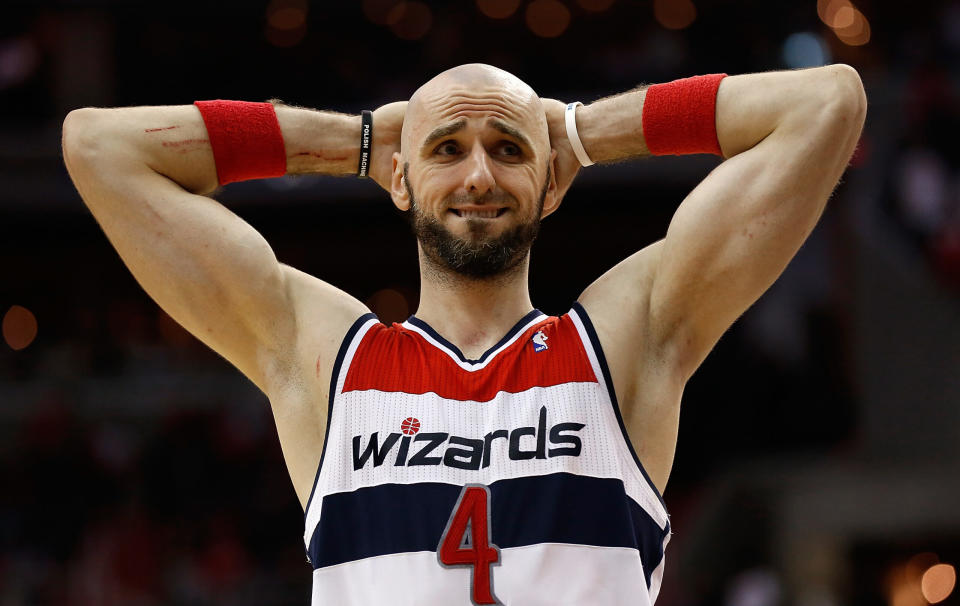
Marcin Gortat, former NBA center, famed for his Gortat screens, rebounding prowess and durability, sat down with HoopsHype to discuss his journey from being the No. 57 draft pick, to surviving and thriving in the league. The 12-year NBA veteran shares insights on his days in Orlando and Washington, stories about former coaches, teammates, challenges in the NBA with social media’s impact, and reflections on his legacy.
I think you could be a first-round pick in today's NBA. Where do you think you'd be drafted NBA today?
MG: It was good to be drafted at No. 57 overall because I’m one of the only two players in the history of the NBA who survived being selected with a 57th pick. It’s me and Manu Ginobili, and there’s nobody else. Everybody else with that pick either plays in the league for a couple of months, maybe a year, and then, or they never made it. So, to be one of the only two players in the history of the NBA who survived with No. 57, it’s impressive. I never had expectations; I was always in a position where “We have this Polish kid he can play, we’re gonna give him a shot, we will try, if he ain’t gonna succeed, then, screw it, we’re gonna take another guy.” So I always didn’t have that pressure on me that “I’m a lottery pick and all of a sudden I have to produce, I have to be great, I have to be an all-star.” I didn’t have that pressure, and maybe that was a good thing for me at the end of the day to be the No. 57 pick. I know for a fact that I was cooking lottery picks back in the day in my prime. I was the No. 57 pick, but I was cooking guys that were in the Top 15 in the league. So there wasn’t a problem. It wasn’t a problem for me. I had more issues with the contracts; back then, in my prime, I made $12 million a year; a guy was earning $20 million, and he was not even as good as I was. And there is a vast difference, like there was the point where I was saying, “This is wrong. [Contracts] are not supposed to be like that.”
If you were to join the NBA today, would you opt for the same route of dominating in Germany instead of attending a college in the USA?
MG: Yeah, I’ll do the same thing. I’ll do it the same way. Most importantly, I would like to pick my coach, Saša Obradović. I would love to be with him. Wherever he went, I would go with him because he was very important to my career. He set up. He made me a player. He built my character from scratch. He made me who I am today. And I learned a lot of things from him. I will not say I learned a lot from the German League. It was a good, strong league, and now it is even stronger than it used to be. But Saša Obradović was the guy who made me as a player, and he was the biggest difference-maker in my career.
What creates this tight-knit community among European players, even beyond their active playing days?
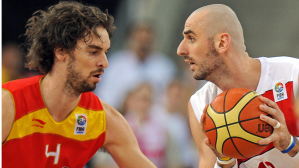
MG: We have similar cultures. That shows who we are; we have the same values, culture, and jokes, and we can spot the same issue or situation in a room. For example, you have one of the guys walking into the locker room with a golden grill and shiny diamonds, and he steps in, smiling all over the place. Everybody else thinks it is normal. Then all of a sudden me, Jan Vesely, or Tomáš Satoranský, “We’re sitting here looking at this like, what is this? This guy looks like a clown. He’s wearing gold diamond teeth. It’s ridiculous.” Next, you see an African-American coach walking in with his super baggy clothes. I’m talking about a potato bag hanging on him as a suit, and we’re looking at him, like, “What the hell is this?” We all crack jokes, like “You could make three suits out of this material; why would you make this suit? You look like an idiot in this suit.” So, we see those differences. We, as European guys, can spot a lot of things the same way. And we can catch a lot of things the same way we speak about when Americans talk about Sunday football, weekend Premier League games, or Barcelona-Real Madrid games, so we just have a different culture and different values and different things that are interesting for us.
Do you believe that in the coming years the United States might not win as many international competitions?
MG: I’m not quite sure they know they’re gonna win much in the future. LeBron [James], at 40, and Durant, not the youngest, along with [Stephen] Curry, who, though great, can’t carry games alone. The German team is getting stronger. Spain has an incredible system. They produce NBA players yearly, sending two or three guys to the NBA every year. France has excellent talent. Greece is getting better. Serbia is a gold mine of basketball players. So, America is in a very tough position. You can see the MVP race right now. You have Giannis Antetokounmpo; you have Nikola Jokic, Luka Doncic, and [Joel] Embiid. 80 percent of these guys are from Europe. Unless there’s going to be a super, super big talent coming into the NBA from the draft, and he’s going to be like, 100 percent pure American, things may change. But as of now, Victor Wembanyama, who came into the league, is French. The way everything looks right now in the NBA is tough. It’s tough. I’m not going to say the NBA is in a bad position. No, but things are changing.
Do you believe that the issue lies with the development of American players in programs like AAU and colleges? Do you think these systems are not adequately preparing them?
MG: It’s not necessarily a problem but rather a shift in generations. The earlier generation, with stars like LeBron James, Dwyane Wade, and Carmelo Anthony, saw multiple superstars entering the NBA at a high level. They never had social media, and they would only be playing basketball. That’s all they had. So, their focus was only on basketball. The new generation is going to be different. And unless there’s going to be, like I said, a rare unicorn that will be another LeBron James, that’s great, but I don’t think it will happen.
Do you think social media is a problem?
MG: The world is obsessed with social media. You have Twitch, and being a streamer, YouTuber, influencer, and basketball player, now, want all these things. How is this possible? Go to a basketball practice when you have them doing TikToks, Instagram, Twitter, and all these other social media that you have to post something. Do you want to become a basketball player? Of course, it is a huge distraction. The first thing you do in practice is record stuff. Why would you do that? How about you focus on practicing your left hand [dribbling]? I am a witness to that; before kids start bouncing the ball into practice, the first thing they do is record stuff around. They’re recording everything; they think that taking pictures with a ball. How about you dribble that ball first before you take a picture? That’s what’s happening right now.
Who is someone you enjoy watching and believe plays the game in the right manner?
MG: I love to watch Kevin Durant, I still think KD is a scoring machine. There’s just nobody that can stop KD. This guy is automatic. He’s the best player in the NBA right now. I know the record doesn’t show that, but if he wants to, he can average 40 [points per game] in this league. You have to give him the touches; he needs to stay healthy. I like Bradley Beal.
You were with the Wizards' most recent successful era. In your opinion, what went wrong during that time?
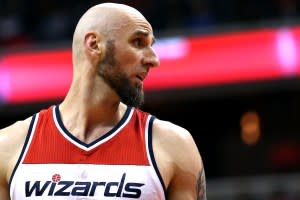
MG: Well, as crazy as it sounds, I will say that we probably should have kept Randy Wittman as a coach. Yeah, I know what I’m saying is crazy, but we should have done that. Why? Because he was the only coach that was able to control John [Wall]. And they were bumping heads, and I was bumping heads with Randy. Randy was a hell of a good coach. And he knew what he was doing. He was able to control John, and he was able to control Bradley [Beal]. And he was bringing the right people on board from a player standpoint. And we were missing, we were missing that one, maybe one or two good role players, for us to make a bigger run. And then also, we needed some luck. John broke his hand in the second or third game against Atlanta, it was over. Our main guy broke his hand; the guy couldn’t dribble the ball. His hand was a giant potato. He wasn’t able to grab anything in his hand. He played a game with one hand. So, we needed some luck.
Randy should stay as a coach and add one or two better signings to the organization. Overall, we all should have done better, but we had an incredible team. Back in the day, when you sat in the plane, when we were flying to another city…. we didn’t care where we were flying because we knew what we were bringing. We were bringing a freaking storm when we showed up. We had so many weapons. We had so many levels: John, Beal, me on the pick and roll, and Nenê inside. Oh my god, we were a hell of a team. And I mean, we were unbelievable. Then, that year, we had Otto Porter Jr. coming off the bench and Trevor Ariza starting. Andre Miller was coming off the bench. We had a squad. However, right now, we only have memories. Like I said, we should’ve kept Randy Wittman.
Considering John Wall's current situation, are you surprised where his career is currently?
MG: It is sad because we anticipated things like that. And I spoke with John. We are on good terms right now. I haven’t talked to him recently for the last couple of months, but I’ve been going back and forth with him for the last couple of years. And you know, at the end of the day, you understand he’s my brother from the Washington team. John is my brother, and we have played together for many years. We had many battles together, and we won many battles. Hearing what happened to him in the last couple of years was tough. You don’t think about basketball when stuff like that occurs in your personal life. And I wish many people could reach out to John and support him. I hope they did. John is in a position right now; I mean, he’s not 20 years old. He is 30-plus years old, he’s had a lot of surgeries, he had a lot of issues with his body, and his knees are probably 60 years old. So, it will take much work for John to return to the league. He can give a team a lot of good things. He’s an incredible leader; he can anticipate many things on the court and run the offense the right way. He can shoot the ball. He can pass the ball. He could help the team. But just the agenda that goes with John is so difficult. It’s so demanding that it will be tough for John to return to the league. He had an incredible and promising career. It’s a very good career. He made a lot of money. He has a family. The only thing he has to do is not just focus on his body but focus on his family. And live his life, I think. That’s the best thing you can do right now.
What are your thoughts on Jeremy Sochan [who is also from Poland]. Have you met him?
MG: I’ve met him very briefly. We are not great friends, and we’re not in touch regularly. But he’s in an unfortunate position, specifically this year, starting the season at the guard spot, playing as a point guard. Then, after 20 or 30 games, he was moved back to his natural position, where I think he belongs and where I believe he can produce more. It’s not a good fit for him and Victor. He needs to improve his shot. Everything starts from the shot, and in the NBA, if he’s never going to be able to shoot the ball at a good percentage, it will be tough. But again, this is his second year in the league. He still has a lot of time; he can improve dramatically in the next couple of years. So we cheer for him, we’ll help. He will support the National Team in becoming better and healthier; Sochan will improve our National Team. But again, he has to continue to work on his game. He has to continue improving and is in the best place in the NBA. I mean, San Antonio with Gregg Popovich. What else do you need?
How was the experience of playing under Doc Rivers. What are your thoughts on Doc Rivers' coaching style?
MG: I didn’t have the best time with Doc Rivers, unfortunately. He’s a good dude and great to talk to with incredible stories and a rich history in the NBA. However, I wouldn’t trust his coaching decisions. I just don’t have confidence in them.
What do you mean by that?
Marcin Gortat: I just don’t trust him in many different areas. I’ve been with some of the greatest coaches in the NBA, and one of the best was Stan Van Gundy. Stan is an incredible coach who prepares you for every game and practice. When things get tough in a game and Stan calls a timeout, you know you’ll get valuable information and a play that puts you on the right path. He’s a leader on the bench, and you can trust that next year, Stan will come up with something to make our team better.
Stan had incredible discipline and work ethic, keeping everyone accountable. He’s an incredible coach, and even now, he remains exceptional. Just listen to what Stan tells you, and good things will happen. Randy Wittman was also a great coach, and I’d say the same for Alvin Gentry. While more focused on offense than defense, Alvin was an encouraging coach who gave you confidence, making you feel important to the team.
Now, going back to Doc, I just don’t trust him. I couldn’t trust him, and that’s it.
Is there a particular reason why Stan Van Gundy seems to rub people the wrong way?

MG: Well, it’s hard for me to speak on what happened in Detroit because I wasn’t there. But in Orlando, it’s clear that Stan Van Gundy is a coach who values having control. He likes things to go his way, and he’ll run things according to his plan, not yours or anyone else’s. He dictates what will happen, and everyone has to be on the same page for the organization to be successful. Perhaps not everyone is willing to align with that approach – I’m just speculating. However, I can say that Stan was one of the best things that happened to me when I entered the league. I joined an organization where I had Brendan Malone, who recently passed away, Stan Van Gundy, and Patrick Ewing as great coaches. I had a great strength and conditioning coach in Joe Rogowski. They built my discipline, they built my work ethic. We went all the way to the NBA Finals. Jesus Christ, you’re telling me that a coach who’s going to build a team like that from scratch and go to the NBA Finals. He did that.
How hard was it losing in the NBA Finals?
MG: If Courtney Lee had made that layup, perhaps we would have been champions. Of course, it’s not solely on Courtney’s shoulders. Reflecting on it now, looking back at the Finals, we were a great team. If I recall correctly, there was a situation where Hedo Turkoglu signed with Toronto, and we brought in Vince Carter. Two or three years later, Hedo came back, and I was traded to Phoenix. We made a decision that, in hindsight, was a bad organizational choice. We should have given [Hedo Turkoglu] the money he deserved, kept the team, and tried for another run. Unfortunately, it is what it is. As a backup player, I didn’t have much say; I could only contribute with rebounds and screens. The decision-making was in the hands of Otis Smith, and that was his call.
That was one heck of a team.
MG: Yeah, a lot of great guys: Brandon Bass, Ryan Anderson, and JJ Redick. We had off the bench JJ Redick, Ryan Anderson, me, and Rafer Alston; the second unit could have made a nice NBA team just the second unit. And imagine the starters. Dwight Howard, Rashard Lewis, Jameer Nelson, Hedo, Courtney Lee, Mickael Pietrus, Keith Bogans, we were fine.
When you look at how the NBA has shifted versus Europe with the stats revolution, do you ever find it not as enjoyable to watch?
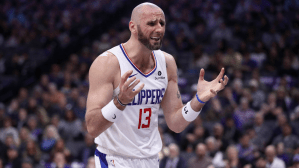
MG: Well, European basketball is different from the NBA for sure. But yeah, I agree with you. I mean, the game has changed. You don’t have post-up games as much as it used to be. There aren’t as many experts in pick-and-roll situations now. Most of the stuff being done is one-on-one isolation and transition. It’s about who’s better in transition, who’s going to score more points. Yeah, the game has changed. There’s no doubt about that.
Who was the hardest person for you to guard in the post throughout your career?
MG: Dwight Howard, DeMarcus Cousins. Yeah, Dwight and DeMarcus Cousins, these two were the toughest. DeMarcus was challenging because he is super skilled but also is a bit of a loose cannon. And then Dwight, due to his physicality and unmatched athleticism, man, that stupid strength was just overwhelming.
How was it to battle Dwight in practice?
MG: Oh my God, it was a nightmare. Covering Dwight in the game was a different story than covering him in practice. There were practices where I almost punched him in the face. I was like, ‘Alright, that’s enough; I’m about to freaking hit you in a second.’ I was on the verge of losing my cool because I was mad and pissed. I mean, I was bleeding in every practice, man. Every practice, my lip, my teeth, my hands were scratched. I still have all the scratches, everything from Dwight, my chest – everything. I mean, he never cut his nails; Jesus Christ. Like I said, I was bleeding every single time. And when Dwight fouled because we didn’t have whistles in practice, every time I’d be like, ‘C’mon, guys, this is a foul,’ and instead, he’d say, ‘Marcin you’re the worst referee in the NBA.’ Like, thanks. So I’m just gonna punch him in the face. I mean, there’s no basketball. I’m gonna literally gangster his ass right now on the court. I’m gonna jump him; I’m gonna beat him up because that’s how it was.
On Reddit the other day, there was a trending post suggesting that the NBA should pass a rule requiring players to cut their nails. Is it an actual problem?
MG: I agree with you. I mean, there should be a rule about it. It’s bad, not from a cosmetic standpoint of whether your nails look good or not. I’m talking about the health aspect – how many times you cut into skin, how many times you’re shaving the skin because, obviously, you’re swiping for the ball, but it’s like you’re trying to scratch people’s hands, and you end up shaving off their skin. You know how many times I get hit in the face and get cut on the body? Yeah, I agree. There should be a rule, but you’ve got to cut the nails.
What do you think is unfair that NBA players get away with, or referees allow to slide by?
MG: Oh man, I don’t know if it’s appropriate for me to say this, but they do a lot of things. I mean, you know, when people box out, they will try to grab your balls and squeeze. I swear to God, they do some crazy stuff.
How do you not just fight someone over that immediately?
MG: Imagine your first reaction is like, ‘Dude, what the hell?’ They smile, and then you’re attacking the guy. However, the referee most of the time doesn’t see the first move. They just see your reaction. So, and then you are screwed, because he sees your reaction. A lot of things happen on the basketball court. Chris Paul will grab your leg or punch you in the nuts too. It happens all the time. So when you set screens, you gotta cover up your nuts and lift weights to make sure your core is strong.
Do you subscribe to the old trend where people argue that the NBA favors offense? JJ Redick made a video refuting this.
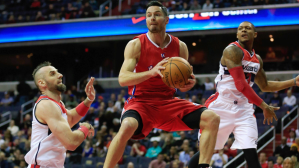
MG: Yeah, I watched that segment with JJ. I think he’s right about it. JJ was right. But I just don’t think there are enough physical players in the league anymore. There are a lot of athletic players coming in, but you don’t have brutes like Kendrick Perkins back in the day, guys like Ron Artest, Rasheed Wallace, Ben Wallace. You don’t have players like that anymore. I mean, sure, you have a few here and there occasionally, but you don’t have these brutal brutes anymore. You know, like me and Nenê, we were super physical back in the day. The only guys who could match the physicality were Marc Gasol and Zach Randolph in Memphis, maybe Al Jefferson, Carlos Boozer a bit. Yeah, [Nikola] Pekovic, but he was alone. Pekovic could not keep up with me running up and down like that. You don’t have physical players anymore like that.
Is there anything you regret about your career?
MG: I wish that after I was waived by the Clippers, I had gone to the Toronto Raptors. They called me six times, and I didn’t go. I could have been an NBA champion today. Instead, I decided to go to Golden State, and they lied to me. They said, ‘No, no, no, we don’t need a big. We’re gonna take this small guy. You gotta take an additional guard.’ And two or three weeks later, they signed Andrew Bogut from the Australian League. That hurt.
My condolences on your father's passing last month. How does it feel to carry on your father’s, Janusz Gortat, legacy with Olympic bronze medals in 1972 and 1976?
MG: There was always an expectation, but I didn’t care about that. I didn’t care about that. It was more about having fun for myself and just following my dreams. Being in the NBA for 12 years was a huge achievement. Back then, there was a massive fire inside my heart. And I was very passionate about basketball. Everything I was doing, I was doing with incredible passion and energy and with incredible will to achieve things. Now, I’m a 40-year-old guy. I don’t look at basketball the same way I did when I was 20 years old, but I know how much I had to sacrifice to become a basketball player and stick in the league for 12 years. Trust me, my body feels this right now. So the funny thing is, I never imagined I would leave a mark in the NBA as I left with the Gortat screens. And I could never anticipate that. I will say, “Okay, it will be great to play in the NBA, it will be great to average a double-double,” but to leave the mark that there will be a Gortat screen for the rest of my life. You know, in the NBA. Yeah, that’s huge. That’s huge.
If you had to share advice with a basketball player reading this – whether a college kid or in high school – what you would offer?
MG: Use every opportunity to get better. Whether it’s watching tape, studying film, utilizing free time to enhance your body and game. Work on maintaining the right level of motivation, develop your weaknesses, and don’t solely focus on your strengths. If you’re a shooter, dedicate time to improving your dribbling and passing – don’t just stick to shooting. Be patient, stay humble, wait for your time, and always stay ready. However, steer clear of social media, especially after a bad game or a good game. Both ways, you’ll encounter negative or overly positive comments that can distract you and affect your focus. So, stay away from social media, basically.
What do you want people to think when they think of Marcin Gorat?
MG: Gortat screen.

 Yahoo Sport
Yahoo Sport 






































